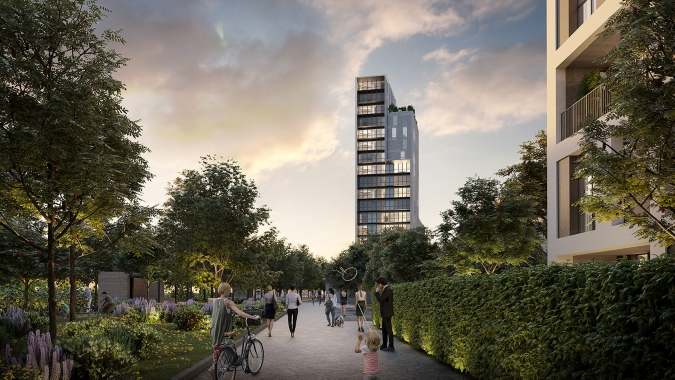L’Innesto: the first Carbon-Neutral Social Housing project in Italy
State-of-the-art affordable homes in Milan
Italy, 27 April 2022 | Energy, The future of the EU & Housing
The area of the former freight terminal Scalo Greco-Breda, located in the north-east of Milan, is soon to be transformed into the first Carbon Neutral Social Housing project in Italy, L’Innesto. The project, developed by REDO SGR and Fondazione Housing Sociale, together with a broad multi-stakeholder partnership, is among the winners of the Reinventing Cities international competition promoted by C40 Cities. The Fondazione Housing Sociale team tells the story.
In getting to know L’Innesto and its founding concepts, a good starting point is the project’s name itself. The word innesto in Italian has a twofold meaning: in agriculture, it refers to a process through which a new plant is grafted into an existing one, increasing its capacity to produce fruits; in a more figurative way, it refers to the insertion of a new element within an existing mixed environment to create a connection. Indeed, the new design for the Scalo Greco-Breda builds on the innesto concept to reconnect the surrounding areas through the creation of an innovative highly connected zero emission district.
The new neighbourhood will bring to the city 400 apartments (around 60% affordable rental and 40% affordable sale), 300 student housing units and a multilayered infrastructural network. The masterplan introduces a system of walking and cycling paths that will connect the railway station with the nearby Bicocca neighbourhood, encouraging pedestrian flows between the Precotto area and the 30.000 daily visitors of the Bicocca University. By promoting sustainable mobility strategies and by optimizing the existing local interchange hubs, the project aims to enhance all the currently disconnected portions of the surrounding territory. Furthermore, 72% of the of the project area will be transformed into green spaces such as gardens, equipped areas, gardening spaces and orchards, which will be part of a broader agricultural park, centered around the green corridor created by Via Breda, the new Viale dei Gelsi and the main public square.
Another fundamental feature of L’Innesto is its innovative social housing model, in which collaborative living is promoted through a system of shared multifunctional spaces, made available to the community of residents but also to the inhabitants of the nearby neighbourhoods and of the whole city. Indeed, the district is conceived as a Human Adaptive Zone, constituted by a network of innovative services such as a Community Food Hub, a Circular Economy District, an Energy Showroom, a Zero Waste Store and a Neighbourhood Welfare System. The articulation of social, physical and technological infrastructures made available at L’Innesto will contribute to create a new shared identity, which will bring together the historical residents and the new inhabitants.
Building on all these elements, it is possible to identify three main objectives through which L’Innesto approaches the 10 sustainability challenges launched by the Reinventing Cities competition:
Building the first Zero Carbon Social Housing district in Italy. In order to achieve this objective, the team selected the most innovative construction techniques and the most sustainable management and plant engineering strategies, with the aim to reach a zero CO2 emission balance within 30 years. Some of the strategies adopted are: a 4th generation district heating (TLR 4G) powered through renewable energies; an innovative construction system; bioremediation and urban forestation; active mobility; the creation of a Zero Carbon Fund, to reduce GHG emissions and voluntary carbon credits.
Introducing a responsible and resilient long-term management of resources, spaces and community. Over the past 10 years, the Lombardy Investment Fund (FIL) developed social housing interventions in Milan and in other cities in the region, building a unique experience in the national landscape based on a long-term management vision, bringing together a structured network of relations and collaborations with social managers, cooperatives and local stakeholders. Unlike most real estate developers, the FIL promotes an integrated management of the whole project, from the design and realization phases to the innovative management of resources, common spaces and community over the first 30 years of life of the project.
Creating a Human Adaptive Zone. The district is conceived as a collaborative neighbourhood, with shared community spaces, urban and neighbourhood scale laboratories and services managed in an integrated way by residents, local operators and non-profits organizations involved in the project. The collaborative neighbourhood is built around the agricultural core, which is preserved and enhanced through the creation of flexible and multifunctional spaces, which will stimulate interaction among residents and users of the district. The presence of a Human Adaptive Zone will allow for the creation of a sense of belonging to the place and will therefore encourage the community and the whole neighbourhood to take care of the area.
REDO SGR and Fondazione Housing Sociale, together with a broad multi-stakeholder partnership, won the Reinventing Cities international competition with three urban regeneration projects in Milano: L’Innesto (Scalo Breda-Greco) ARIA (Ex-Macello) and Green Between (near the Crescenzago metro station). The competition is promoted by C40 Cities, a network of around 100 world-leading cities collaborating to address the climate crisis and to create an inclusive, prosperous and sustainable future. The Reinventing Cities program invites creative multidisciplinary teams to transform and revitalize under-utilized sites located in different global cities.
The three projects, L’Innesto, ARIA e Green Between, aim to be Carbon Neutral Pilot Areas, in line with the Air and Climate Plan adopted by the Municipality of Milan in December 2021, a systemic instrument entailing 49 mitigation, adaptation and resilience actions in five fields of intervention: health, connection and accessibility, energy, temperature and awareness.
Leave comments